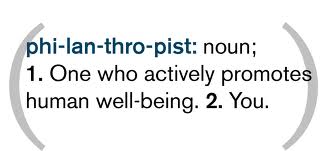For the month of April we want to talk about philanthropy. As we shared in last week’s post, giving to others leads to happiness! Now that you may be thinking about donating, we want you to be informed. You may think there isn’t much for you to know because you are an individual and not a corporation, but there really is! We want your $10, $20, $50, or $100 donation to benefit a positive, worthy organization.
Here are some tips to help you decide when to donate, and who to donate to:
- Location. Where is this organization located? Is it in your community or state, is it in the US or is it abroad? Think about what is important to you. While you may love what an international organization is achieving half way across the world, you might feel more satisfaction being part of change you can see.
- Scope. Similar to location, what is the breadth of this organization? Do they have a local focus or an international component. Is this important to you?
- Population. Who is this organization serving? If there is a particular population that interests you, you should seek out organizations that are empowering those communities. Perhaps you love working with youth and want to donate money to a mentoring organization. Or an environmental organization that focuses on endangered animals. What drives your passion? Find that, and be part of that positive change!
- Values. What are the values and mission of the organization? Do you agree with them? While you may love what an organization is doing in a community, you might not love their values. Think about what is important to you, and what you can and cannot support. Your values may differ religiously, politically, or ethically.
- Time. Where are you in your life? If you are feeling pressure financially, wait! There is no rush to donate to an organization. You don’t want to regret that donation you made, it could lead to guilt! Some people find it best to donate after retirement or when they settle into a stable career. If its a small donation, maybe that $5 you found on the street can go towards the community program providing ESL courses. Decide what time is best for you.
- Future. What are the long-term goals of this organization? And can you see them reaching these goals?You don’t want to donate to an organization only to find out they went under a few months laster. This doesn’t mean you only donate to long-standing organizations. Just choose ones that seem to be on the right path. Trust your gut, and your heart.
If you’re really feeling up to the challenge of being an informed giver, check out this list of investment strategies from Strategic Philanthropy.
Now that you have all of this knowledge in your head, go out and make a difference as an informed giver!


